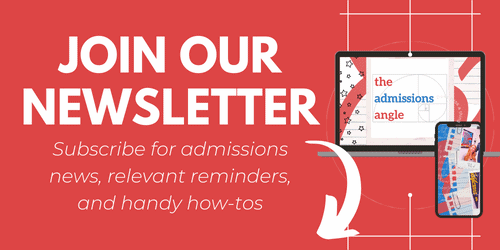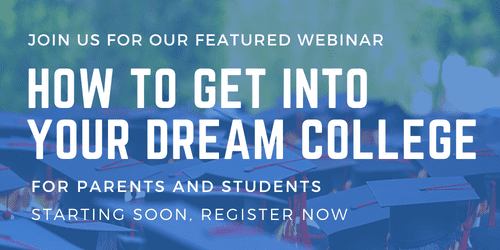
How to Ace Your College Interview
Part 1: General Tips
Need a quick list of tips for your upcoming college interview?
Read the advice that I give to all my students before their dream school interviews.

By ALEX LOVELESS
The college interview allows colleges to get a more personal grasp of who you are as an applicant. For some, it’s daunting because most students haven’t done an interview before. Students also hear the horror stories from their friends of the icy interviewer that showed up late, didn’t crack a smile the entire time, and then cut them off after only 20 minutes. However, I can assure you that this experience is the exception to the rule and that most interviewers are warm, open-minded, and happy to just have a good conversation. But first, let’s answer the following question.

Should I Participate in an Interview?
The short answer is yes, in most cases, you should take the interview, especially if an alumnus has reached out to you for one. This is particularly true for top schools that strongly recommend that you participate. In these instances, even if you have severe social anxiety, I recommend that you participate.
On the other hand, some schools treat interviews as optional and instead of sending representatives around the country or reaching out to students via email, they offer in-person interviews during campus visits or Skype interviews. In these situations, although participating in a successful interview would represent a net positive in your admissions profile, if you suffer from crippling social anxiety, then it’s probably best to allow the rest of your application to represent you.
Overall, however, most students should plan to interview for schools that offer them. The following tips are ones that I give to every one of my students to help them feel at ease and confident going into the process.
“The short answer is yes, in most cases, you should take the interview, especially if an alumnus has reached out to you for one.“
College Admissions Services
Schedule a Free Consultation
Meet with a mentor one-on-one via video chat to talk about your son/daughter’s admissions plan. Afterwards, receive a no-obligation Customized College Roadmap (CCR) with advice on courses, extracurricular activities, standardized tests, and Admissions Angle strategy.
General College Interview Tips
- Focus on just getting the interviewer to like you. This is just another social interaction, so you want to make sure to come off as likable, polite, and attentive. This can be as easy as smiling a little more than usual, or nodding when the interviewer says something interesting that you agree with. This can be challenging for students that are more reserved or have some social anxiety, so the best way to prepare for this is to practice, bringing me to my next point.
- Do mock interviews with an adult and record yourself. For best results, try to find an adult that you don’t know very well or at all, but it can be hard to find somebody like that who will take the time to help you. Of course, getting an expert admissions consultant to help you can cost money, but does represent a good option. In any case, any competent adult will do but you should make sure to record yourself in the interaction. Ask the adult to use a list of commonly asked interview questions, like this one. They don’t need to ask all the questions, but I would make sure to at least go over the “tell me about yourself”, “why do you want to go to x college”, and “what will you contribute to the x college community” questions. After the interview, watch yourself and do a little critique of your answers and your social cues. It’s always a little cringy to watch yourself speak, so don’t be too hard on yourself, but try to be aware of any tics that you have or answers that need to be better prepared.
- Do your research. This should be obvious to most, but you’d be surprised at how many socially overconfident students disregard this aspect of the interview and expect their charisma to make up for it. If your answers aren’t specific when they ask you “Why do you want to come to our school?”, you’re going to score low for demonstrated interest and negatively affect your admissions profile. Make sure to have specific programs, clubs, courses, or professors to talk about. Also, make sure to have specific questions prepared for each interviewer. They should be questions that can’t easily be answered on the school’s website, like asking the interviewer personal questions about their experience attending the school.
- Talk more than usual. This tip is mostly for those who again, are a little more on the shy side. I tell my students to always lean towards overexplaining an answer rather than underexplaining it. While a question about your favorite academic subject can be answered with a single word (“math”), you always need to give the interviewer more insight. You need to answer every question as if you know they’re going to ask you the follow up of “why?”. Again, if you’re not used to speaking as much, do your research so you have plenty to talk about and practice speaking in your mock interviews.
- Audit your public presence on social media. There’s a chance that your interviewer will try to do some light research on you ahead of time, so you want to make a good impression. You should be doing this anyways in case admissions committees also decide to check out your online presence. For more information on this, read here.
- Try to find your interviewer on social media. If they’re going to look you up, why not do the same? This can be helpful for several reasons that revolve around preparation. You can get an idea of what the person looks like so it’s easier to find them at the coffee shop. You can also get a sense of what industry they currently work in or what they majored in at school. This can help you come up with targeted questions. ***Caveat*** Don’t ask questions that make it REALLY apparent that you’ve been stalking them online. It’s okay to indicate that you know what industry they work in, but not okay to bring up the fact that you know that they live on 44 Juniper Street in San Jose.
- Keep your answers positive. This is important to demonstrate that you’re an optimistic person. You especially want to stay positive if your interviewer asks anything about your personal weaknesses; you always want to end your answer on how you’re addressing a weakness or how far you’ve come in addressing it. Also keep in mind that a conversation with an interviewer can take a lot of twists and turns, and maybe you catch yourself talking about something personal or a difficult time in your life. This is not necessarily bad, but if you do catch yourself talking about this difficult time, make sure to again, end on a positive note by talking about what you’ve learned from the experience or what new insight it’s given you.
- Give only about 70% honesty. This number is arbitrary, but the point is that you don’t want to be too honest with the interviewer. General rules for what you should talk about with a person you’ve only just met apply here. Even though your answer to “what’s the biggest obstacle you’ve overcome?” might be a time in high school that you got caught cheating on an exam, you don’t want to reveal this piece of information to your interviewer. It represents a red flag. Another question to be careful about answering too honestly is the “What would you change about your high school?” question. While they do want you to point to something particular that you think your school can improve on, they don’t want a sarcastic comment about how everything needs changing or a laundry list of all the things you would change. This can come off as a little ungrateful or disconnected from the community itself, so give one area of weakness that you would change. Better yet, mentioned an aspect that you yourself have tried to address.
- Think about what aspects you want to highlight. If they ask you about your hobbies and the hobby you spend most of your time doing is playing video games, maybe try to deemphasize just how much time you spend playing and overemphasize some other hobbies you have that are a little more engaging.
- And finally, the interview matters less than you might think. This is something I tell all my students. In the grand scheme of the entire admissions process, the interview represents a small part of your overall profile and will not be the only reason that you get accepted or rejected from a school. I’ve had plenty of students tell me how their interviewer told them something really positive about the interview, one saying “you’re the best-qualified student I’ve ever interviewed”, only to get rejected from that school. And vice versa. Knowing that the stakes are not that high can help put your nerves at ease and focus on what’s important: having a great conversation.







